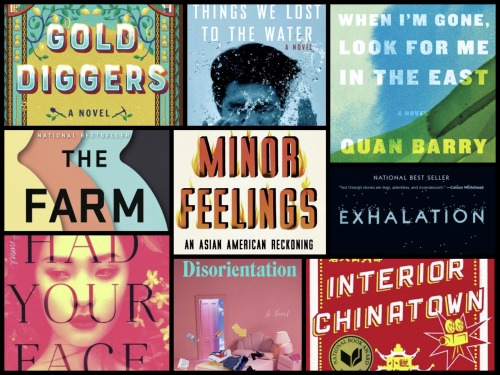#asian characters

I am beyond thrilled to share the RUSE cover with you!! The cover art is by Jason Chan, and as much as I loved the WANT cover, I think my adoration of RUSE matches that!! Jason is an incredible artist, and I feel so lucky!! I think what I love most about the cover is that it features a bespectacled heroine!! :D WANT is currently $5.99 where ebooks are sold, so pick it up if you haven’t yet!!
…
In near-future Shanghai, a group of teens have their world turned upside down when one of their own is kidnapped in this action-packed follow-up to the “positively chilling” (The New York Times) sci-fi thriller Want.
Jason Zhou, his friends, and Daiyu are still recovering from the aftermath of bombing Jin Corp headquarters. But Jin, the ruthless billionaire and Daiyu’s father, is out for blood. When Lingyi goes to Shanghai to help Jany Tsai, a childhood acquaintance in trouble, she doesn’t expect Jin to be involved. And when Jin has Jany murdered and steals the tech she had refused to sell him, Lingyi is the only one who has access to the encrypted info, putting her own life in jeopardy.
Zhou doesn’t hesitate to fly to China to help Iris find Lingyi, even though he’s been estranged from his friends for months. But when Iris tells him he can’t tell Daiyu or trust her, he balks. The reunited group play a treacherous cat and mouse game in the labyrinthine streets of Shanghai, determined on taking back what Jin had stolen.
When Daiyu appears in Shanghai, Zhou is uncertain if it’s to confront him or in support of her father. Jin has proudly announced Daiyu will be by his side for the opening ceremony of Jin Tower, his first “vertical city.” And as hard as Zhou and his friends fight, Jin always gains the upper hand. Is this a game they can survive, much less win?
ADD RUSE to your goodreads!
Originally posted at Rivtedlit.


May is Asian Pacific American Heritage Month! Here are some recent titles by Asian American authors writing young adult speculative fiction and genre titles you can enjoy! Please let me know if you recommend any young adult genre titles by those from Pacific islands heritage in comments. Thank you!
A Line in the Dark by Malinda Lo
The Epic Crush of Genie Lo by F. C. Yee
The Speaker by Traci Chee
Rebel Seoul by Axie Oh
Not Your Villain by C. B. Lee
WARCROSS by Marie Lu
EXO by Fonda Lee
Chainbreaker by Tara Sim
The Ship Beyond Time by Heidi Heilig
Dove Alight by Karen Bao
A Crown of Wishes by Roshani Chokshi
WANT by Cindy Pon
A Thousand Beginnings and Endings edited by Elsie Chapman and Ellen Oh
Heart Forger by Rin Chupeco
Forest of a Thousand Lanterns by Julie Dao
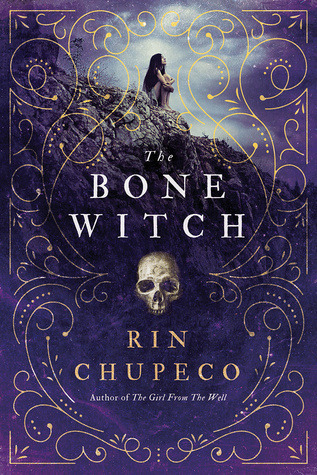

I was six years old when I learned that I had an older brother I would never meet. Growing up in a slightly traditional Chinese family, we’re not used to expressing emotions and feelings. But it was clear that my mother’s miscarriage had cast a pall over the family, even when it went unspoken. My parents had been looking forward to having a baby boy, and on the rare moments when that topic came up (often unexpectedly) in conversation, I could sense that quiet sadness that never went away.
I was in my teens before I realized that I—or my father, or the both of us without either side acknowledging—might have started compensating for that absence. I was always tomboyish, and I gravitated to action figures, martial arts, and rough sports. I’d always been the daddy’s girl. My father was an award-winning basketball coach, and while basketball initially didn’t strike my fancy I joined basketball camps that he helped oversee and and practiced mainly to spend more time with him. We had similar interests in pop culture and the like, so we were quick to bond over them - he taught me how to speak Klingon, bought me my first light saber, played video games together.
It wasn’t until I was much older that I realized that these were easily things he could have done with my older brother or—what would probably have happened—things we both could have done with my older brother. I’ve heard of other Chinese parents, fathers in particular, who resent not having a son and often take that frustration out on their families. To his credit, my father never did any of that. But I could see his wistfulness when he played with some of my younger cousins, singling out one of them in particular to constantly tease and play pranks on (jokes and humor were his chosen method of expressing affection), or on those rare occasions when anyone ever alluded to my older brother. I saw it most clearly in his unabashed happiness when I told him he was going to have a grandson, and when he nearly broke down when Ezio was born.
It was when I was pregnant that I started thinking about that brother more often than I ever had in the past, (brought back to the fore most recently, since my little Ezio is about to have a new sibling as well). I had just finished The Suffering, the sequel to the Girl from the Well, and while I’d taken a few months off from writing to prepare for a toddler I’d also been at a loss over what to write next. Somewhere during those sleepless nights where I had to wake every couple of hours to feed my baby or pump, I started coming back to that. My brother didn’t even get to have a name, and it felt wrong for him not to have one. I thought about giving him one, thought about Chinese mythology where spirits could come back from the dead—not to haunt and terrorize like Western urban legends, but sometimes to comfort and impart knowledge.
In Chinese lore, they sometimes came back as fox spirits.
Chinese spirits were also transcendent, intelligent specters—in many stories they show themselves to philosophers while the latter meditate or study; sometimes they even take tea with them.
So I started writing about a girl named Tea and a brother she brought back from the dead, named Fox.
The Bone Witch is a lot of things - a ghost story, a warning about how absolute power can go wrong, a coming of age story, a vengeance quest, a magic tale, a treatise about the patriarchy and how even well-meaning matriarchies can get things wrong.
But at its heart, in its truest, purest form of heartsglass, is just a story about a girl and her brother.
The Bone Witch is about learning to live together, about what it’s like to be family.
The Heart Forger is about learning to make choices beyond that family, to be independent while still learning to give each other space, about learning to maintain that love despite change.
And the Shadowglass, due out next year, will be about learning how to say goodbye.
And I think it’s the best eulogy about my brother that I’ve ever written.

Despite an unsettling resemblance to Japanese revenants, Rin always maintains her sense of hummus. Born and raised in Manila, Philippines, she keeps four pets: a dog, two birds, and a husband. Dances like the neighbors are watching.
She is represented by Rebecca Podos of the Helen Rees Agency.
The Bone Witch and The Heart Forger are available for purchase.
By Sarah Raughley

You know, it’s always cool to read letters from fans of the Effigies series who really appreciate the fact that the titular Effigies are from a racially diverse background—Maia being of mixed Jamaican—American descent, Chae Rin being Korean Canadian, Lake being Nigerian-British and Belle being French. For me it was very important to have the Effigies be as global as the story. This is a world, after all, where any girl in the world could potentially become an Effigy. It wouldn’t make sense, then, for the characters to be an all-white band. When I’m able to do events with kids in the community, for example A Room of Your Own in Toronto where I talked with girls of color at the public library, it’s just phenomenal to see with your own beady little authorly eyes just how important writing diversity is.
And it’s weird because I’ve been told so many times by certain people that there must be a point to the diversity in your book, which I think for them means that your characters’ non-whiteness must be the crux of the story, the world building and/or the characters’ own personal arc. My personal approach to racial diversity is a little different. Of course, our backgrounds inflect who we are in many ways and gives us experiences that others may not have had. However, for my characters, rather than thinking of them as Korean first, or black first, or white first, I think of them as characters first. That means understanding that despite what differences we may have depending on what our ethnicity or nationality is, what makes us human is fundamentally the same. We are all driven by feelings, fears and desires that shape who we are as people. The fact, for example, that I’m Nigerian Canadian doesn’t mean that I somehow respond radically different than someone else when I am in pain or confused or scared for my life, nor does it mean that I’ll react exactly like another Nigerian or Nigerian Canadian would. Certainly, there are cultural behaviors that are learned when you grow up in certain cultural environments, but ultimately, the simple fact of one’s racial makeup cannot be the determining factor of how we act and who we are. Though some would want you to think otherwise, we as human beings have far more in common with each other than with any other species; certainly, regardless of our skin tone or nationality, we have far more similarities than differences.
For me, writing diversity means understanding that cultures and ethnicities are not a monolith. I am not like every other Nigerian or every other Nigerian Canadian or every other diasporic Nigerian living on this planet. I have my own personality, my own presence, my own voice (fun fact, I’ve been told over the phone that I sound like a white girl, which is a lot to unpack) based on how and where I grew up, based on my experiences, and everything else that goes into making someone an individual. If human beings can’t be pigeonholed into certain molds of personality, voice, and behavior based on their ethnic makeup, then neither can (and neither should) characters.
So while diversity is important, one crucial aspect of diversity in books is not approaching it with stereotypical, preconceived notions for how certain characters of a certain race are supposed to act, sound etc. In Fate of Flames and Siege of Shadows, the ethnicities and nationalities of the characters are part of who they are; but as a reader, what you’ll see before their ethnicity is what I always intended for you to see:
Their humanity.
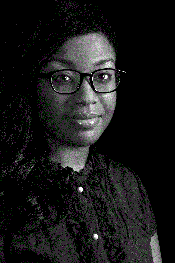
Sarah Raughley grew up in Southern Ontario writing stories about freakish little girls with powers because she secretly wanted to be one. She is a huge fangirl of anything from manga to SF/F TV to Japanese role playing games. On top of being a YA writer, Sarah has a PhD in English, which makes her doctor, so it turns out she didn’t have to go to medical school after all.
Siege of Shadows is available for purchase.
TODAY IS THE DAY! The YA world finally gets to have more Malinda Lo to read! I had the pleasure of beta reading this book, and this deliciously dark thriller is one of my favorites by Malinda. Just look at this stunning cover!

Jess Wong is Angie Redmond’s best friend. And that’s the most important thing, even if Angie can’t see how Jess truly feels. Being the girl no one quite notices is OK with Jess anyway. While nobody notices her, she’s free to watch everyone else. But when Angie begins to fall for Margot Adams, a girl from the nearby boarding school, Jess can see it coming a mile away. Suddenly her powers of observation are more curse than gift.
As Angie drags Jess further into Margot’s circle, Jess discovers more than her friend’s growing crush. Secrets and cruelty lie just beneath the carefree surface of this world of wealth and privilege, and when they come out, Jess knows Angie won’t be able to handle the consequences.
When the inevitable darkness finally descends, Angie will need her best friend.
“Lo has delivered an intricate tapestry of narrative, woven in a labyrinthine pattern of secrets and colored with intersecting hues of Chinese-American identity, the dark intensity of relationships, and telltale stains of blood.”—Kirkus Reviews (starred review)
“With an active focus on female friendships and relationships, A Line in the Dark is a twisty, dark psychological thriller that will leave you guessing til the very end. The story follows two friends down a path of dysfunction and murder as one of them, Chinese-American Jess tries to balance the expectations of her family, her fraught relationship with Angie, and her mounting sexual attraction for her. Lo offers some impressive storytelling, a chilling plot, and mean girls aplenty.”—Teen Vogue
A Line in the Dark is available for purchase now.

Starfish is a book about family, and identity, and finding hope in a world that often makes it difficult. But it’s also a story about how necessary the truth can be.
I know what it feels like to be afraid to tell your story, and what it feels like to keep your fears bottled up in your heart. I know how lonely it can be to be surrounded by people who see you, but don’t really seeyou. And I know what it feels like to be worried that after finding the courage to open up to people, there’s still the risk that they might not believe you.
My hope is that people will read Kiko’s story and feel like someone knows what they’re going through—what they’vebeen through. I hope they feel more understood—more hopeful. And I hope they feel like they’re not so alone in the world, and that there’s someone else out there who “gets it” too.
A reader once wrote to tell me how Starfish helped them to heal, and that they hoped writing it had helped me to heal, too.
I stared at those words for a long time, wondering how they could possibly know something about me without knowing my own story.
But then I understood: I didn’t have to tell them. They just knew, the way I did. And maybe when you share experiences—when you see a mirror reflecting your story—you recognize the place it must come from.
And I guess even though I wrote this book to help readers feel seen, it allowed some people to see a part of me, too. I’ll never be able to find the right words to explain what that felt like, but maybe I won’t have to. Maybe the people who read Starfish—the people who need this book the most—will know exactly what it means to have a mirror. Maybe they’ll understand what it means to have someone know your truth.
I know there will be people who might not understand this story. Maybe they won’t understand Kiko’s social anxiety, or what it means to feel too Asian or too white but also never enough of either. They might not have experienced emotional abuse from a loved one. Or maybe they won’t think Kiko’s story fits into their own idea of realistic, because it isn’t a mirror of their own experiences.
But I didn’t write this story for the people who need to be convinced.
I wrote it for the people who needed to see their own experiences brought to life. I wrote it to give them a voice—a mirror. I wrote it for the people who already know.
Sometimes villains exist in quiet, unsuspecting places. Sometimes they’re loud. Sometimes they live inside you, and sometimes they live in your reflection. And sometimes they exist in the memories and secrets you live with every day.
If you live with anxiety or you’re a survivor of abuse, you don’t have to explain anything to me. I don’t need to be convinced what the villains in your world look like. I don’t need you to make me understand why they’re real.
I believe you. Your story is believable.
I hope you find a friend in Kiko. I hope Starfish helps you to heal.
And most of all, I hope you feel seen.

Akemi Dawn Bowman is the author of Starfish(9/26/17, Simon Pulse/Simon & Schuster) and Summer Bird Blue (Fall 2018). She’s a proud Ravenclaw and Star Wars enthusiast, who served in the US Navy for five years and has a BA in social sciences from UNLV. Originally from Las Vegas, she currently lives in England with her husband, two children, and their Pekingese mix. She is represented by Penny Moore of Empire Literary.
Starfishis available for purchase.
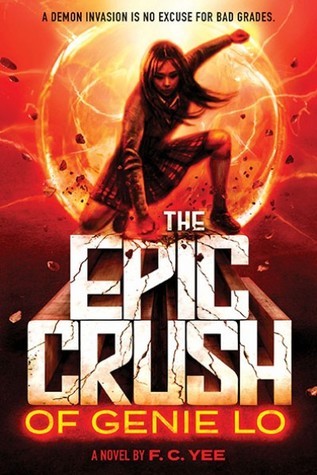
THE EPIC CRUSH OF GENIE LO was definitely not the first book I’d ever written. Back when it only existed as a single chapter and some ideas about the characters, I was trying to get a completed middle grade book off the ground. I attended a writer’s workshop with a group critique session, hoping to get the insight I needed to finally make my MG work viable.
Once I arrived at the conference, however, I was told I’d been sorted into a YA critique group. This kind of thing tends to happen when your last name is at the end of the alphabet. Everyone gets sectioned off into the teams/groups/classes that are available in A to Z order, and as someone who arbitrarily fails to make the cutoff, you get to fill whatever’s left open.
So I pulled an audible. Instead of reading from my middle grade book, I read the opening pages of GENIE LO, which were pretty much unchanged from the published version, if you’ve seen those already. And to my surprise, the group liked it! They told me it was funny and attention-grabbing, which was exactly what I’d hoped for.
Then they asked me how the story and characters would develop. “What’s Genie like?” someone asked. “What’s her dominant emotion?”
“She’s angry,” I said.
The room kind of turned when I said that. I could see the hesitation in the group.
“Angry against injustice?” someone offered, trying to add a helpful qualifier to my description.
Well that too, I remember thinking.
I could have been reading too much into that moment. And I certainly am not denigrating critique groups at writers’ conferences; the very same people at the session helped me flesh out what THE EPIC CRUSH OF GENIE LO would eventually become. I owe them a great deal. But I do remember that one little hitch in time where it took a bit of mental effort for them to reconcile an angry protagonist with a sympathetic one.
Genie is overtly frustrated with what can be a dehumanizing process for many at her age—college applications. The idea that you can be denied opportunity and self-actualization by a gatekeeper who won’t even spend that much time judging you is maddening. I saw a fictional parallel where other creators have before, in Sun Wukong’s struggle to gain acceptance among the gods. But I also saw a personal one in the post-college career difficulties I was having at the time. The fight to be accepted as worthy never really ends. Or at least that’s how I felt about it.
Further complicating matters is when life doesn’t even let you focus on your own fight, and demands that you do some heavy lifting for others. In Genie’s case, she has to protect her town from an invasion of demons who won’t let well enough alone, simply because she happens to be the strongest one around. Important tasks often fall to the people who are already working the hardest, not to those with the most time and resources on their hands. I wanted to write about this in a way I hoped people would recognize, visible under the action and comedy and romance.
Anyway, if you want to see what happened when I doubled down on Genie being angry rather than back away from the characterization, you can check out THE EPIC CRUSH OF GENIE LO when it comes out on August 8th.
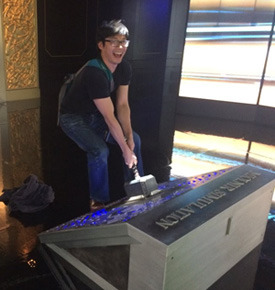
F. C. Yee grew up in New Jersey and went to school in New England, but has called the San Francisco Bay Area home ever since he beat a friend at a board game and shouted “That’s how we do it in NorCal, baby!” Outside of writing, he practices capoeira, a Brazilian form of martial arts, and has a day job mostly involving spreadsheets.
The Epic Crush of Genie Lo will be available for purchase on August 8th!

Even before there was Ghost in the Shell, there was LUCY. Admittedly, it was pretty much agreed that LUCY was a crappy movie all round, but I only had to suffer the trailer to know that it was not for me. It opens with ScarJo kidnapped by Taiwanese mafia type, before she gives the bad boys the ass kicking they deserve. Asian mafia/triad/gang is a western media trope hollywood falls upon time and again. But what really got me was when ScarJo escaped, she was shouting “Do you speak English?” and then shooting Taiwanese who didn’t. Sure, maybe it was another triad baddie, but WTF ever. The fact that Hollywood did not see the heavily racist overtones of this opening scene is unsurprising… and infuriating.
So in one of the first major Hollywood movies where my birth city is featured on the big screen, ScarJo is shown gunning down Taiwanese men and demanding that they speak English. *insert appropriate RAGE gif here*
I joke that I write All Asian All the Time. But it’s not really a joke if it’s true, is it? WANT is my first near-future thriller set in Taipei with a cast composed entirely of Asian and Pacific Islander characters, and a Taiwanese hero featured prominently on the cover.
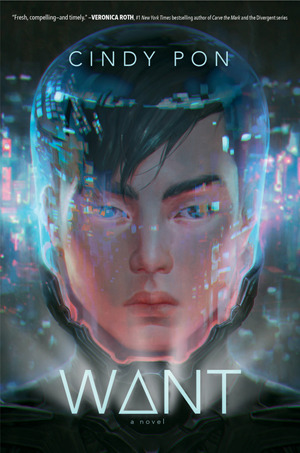
WANT is the first YA set in Taiwan I am aware of released by a bigger US publisher, and definitely the first YA SF. The cover art was designed by the amazing Jason Chan, and my audio book is narrated by Chinese American actor Roger Yeh. I had requested an Asian voice actor and my awesome audio book publisher honored that request! You can listen to a sample of Roger’s fantastic narration here.
It hasn’t been an easy journey. Publishing is a rough business, period, but when you’re insisting on writing novels with basically entire Asian casts, your story is seen as too niche, an outlier. Asian Americans have been othered in western media from the beginning, and it comes as no surprise this was also the case in young adult novels.
There is no greater compliment for me as a writer than to have a reader tell me they could see my books made into a movie, but also probably nothing as heartbreaking. I know my narratives are too western for Asia and too Asian for the west to garner interest from film or dramatic rights. It would be too much of a risk, too big of a leap. As Americans, we’ll accept immigrant stories from Asian Americans (and not much else), we’ll admire and ogle the “exotic” Asian backdrops, costumes, customs, culture, and women. But Asian faces will still be relegated to the background as side characters to provide some “authenticity” and lend to the Asian ambiance.
These are not the stories I write, friends. And I will continue to put Asian protagonists at the forefront of all of my stories. I celebrate each publication as a triumph, and my heart is lifted by the young Asian American creators and storytellers I see rising to tell their own tales—to bring to life what we personally never got to see as young readers.
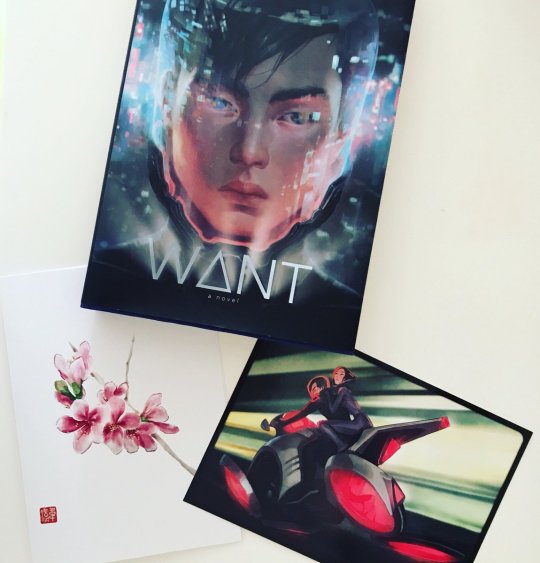
WANT releases June 13th and can be purchased (mostly) where all books are sold. Or you can order through my favorite indie Mysterious Galaxy Books to receive signed and personalized copies (while supporting indie, woohoo!) and I’ll include gorgeous art swag by Jason Chan and myself.
I’m so thrilled to share WANT with you, readers. I hope you fall in love with these characters and Taipei as much as I love them.
AddWANT to your goodreads.

Cindy Pon is the author of Silver Phoenix (Greenwillow), which was named one of the Top Ten Fantasy and Science Fiction Books for Youth by the American Library Association’s Booklist and one of 2009′s best Fantasy, Science Fiction and Horror by VOYA; SerpentineandSacrifice(Month9Books), which were both Junior Library Guild selections and received starred reviews from School Library Journal andKirkus, respectively; and WANT (Simon Pulse), also a Junior Library Guild selection, is a near-future thriller set in Taipei. She is the cofounder of Diversity in YA with Malinda Lo and on the advisory board of We Need Diverse Books. Cindy is also a Chinese brush-painting student of over a decade. Learn more about her books and art at http://cindypon.com.
you know… with this rise in interest in east asian culture and “aesthetics” over the past couple of years also comes with a rise in asian cultural appropriation… so for every nonasian out there who would consider themselves a fan of cutesy asian things or stuff like kpop or anime, you guys have an obligation to people of the culture you’re enjoying to be informed and educated about their struggles. it’s not right to love and consume cultures that’s not your own while ignoring the people who are part of them. read up on appropriation, the fetishisation and infantilisation of east asian women and desexualisation of asian men, whitewashing in media, xenophobia, the erasure of our achievements and the model minority myth. you owe it to us east asians to be educated on topics that concern us if you’re going to continue to consume media and content we make.
EDIT: if you’re nonasian please reblog this so that other nonasians can see it!!
Must-Read Books for Asian American, Native Hawaiian, and Pacific Islander Heritage Month
[via Penguin Random House]
This Asian American, Native Hawaiian, and Pacific Islander Heritage Month, celebrate the many cultures and stories within the AANHPI community with books by authors of Asian, East Asian, Native Hawaiian, and Pacific Islander heritage and cultures. #RepresentAsianStories
- The Farm by Joanne Ramos
- The Joy Luck Club by Amy Tan
- Interior Chinatown by Charles Yu
- Whereabouts by Jhumpa Lahiri
- When I’m Gone, Look for Me in the East by Quan Barry
- Things We Lost to the Water by Eric Nguyen
- A Place for Us by Fatima Farheen Mirza
- Disorientation by Elaine Hsieh Chou
- Time Is a Mother by Ocean Vuong
- Exhalation by Ted Chiang
- The Swimmers by Julie Otsuka
- America Is Not the Heart by Elaine Castillo
- Gold Diggers by Sanjena Sathian
- Fiona and Jane by Jean Chen Ho
- The Fervor by Alma Katsu
- If I Had Your Face by Frances Cha
- How Much of These Hills Is Gold by C Pam Zhang
- Beautiful Country by Qian Julie Wang
- Hotel on the Corner of Bitter and Sweet by Jamie Ford
- Minor Feelings by Cathy Park Hong
- A Tale for the Time Being by Ruth Ozeki
…
Click through to see more titles.
Post link

